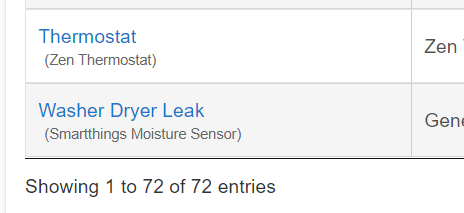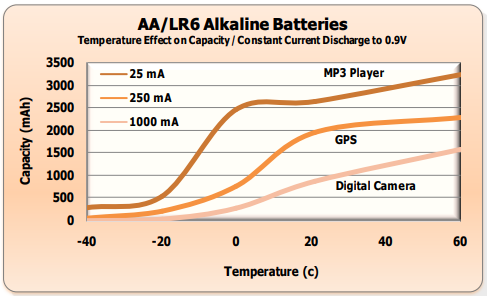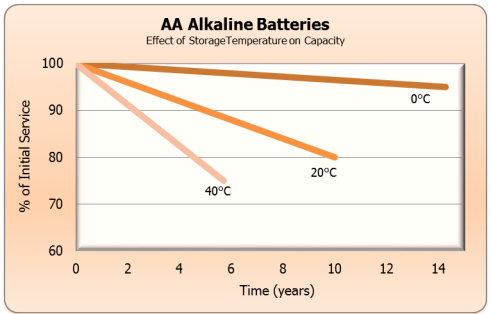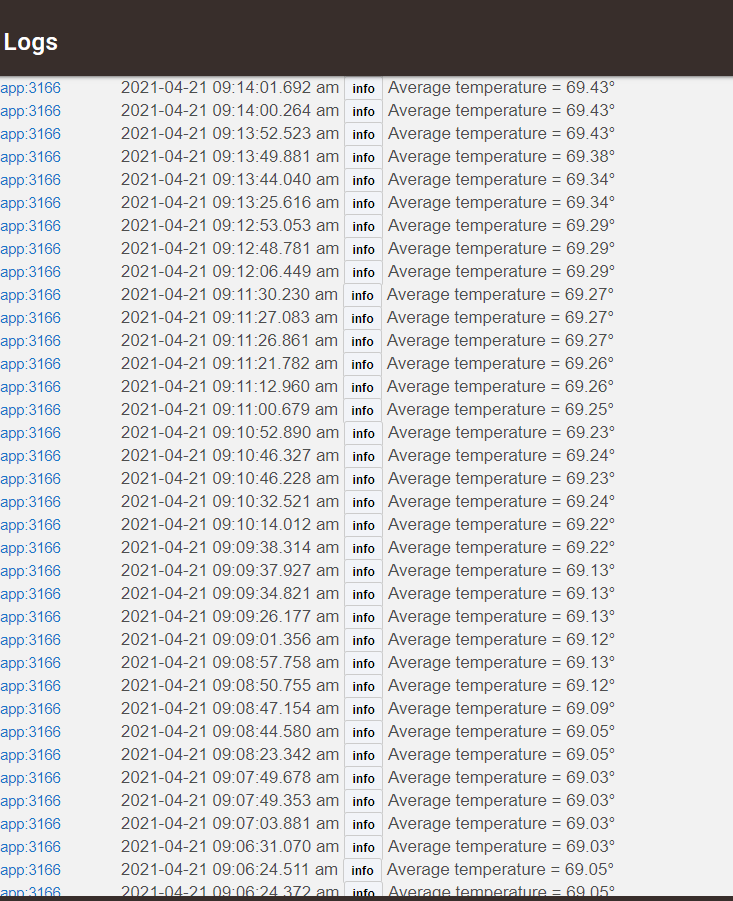I have two of the outdoor sensors that have reached -17 degrees and have yet to change the batteries after 2 years
I changed the driver 15 minutes ago to report every 5 minutes. You can't ask for more accurate.
I don't even own a hue hub, so HE isn't connecting to one here.
There are differences here.
The unless your drive is incredibly busy, a freeway perhaps, you won't get volume of traffic I am getting in every tome of my house and in some cases multiple sensors per room.
Replacing a couple of batteries every two years is not too onerous - and certainly better than most zwave and zigbee sensors battery life.
At the moment I have 30+ Hue Motion Sensors running off two Hue Hubs and they are rock solid.
I may have to change batteries on one, maybe two a month, fortunately a simple task I can accept for timely accurate readings.
Under the control of the Hue Hubs I have rock solid lighting that is 90% totally automated and never fails.
While they are doing that I get 'free' temperature reports.
Win win.
There is where the difference appears to be, it has nothing to do with the "hubs", If you have hue lighting on your hub hub then each of those bulbs on that hub (i'm pretty sure) act as a repeater further expanding your mesh. I don't believe (I could be mistaken) that zigbee bulbs are very good repeaters on HE. So if you don't have adequate repeaters on your HE then your reliability will fail. The bottom line isn't that the devices work better on one vs the other, the work equally if your mesh is equal, which doesn't appear to be the case in your testing.
Here is the logs from my house average temp monitor, every entry is a device reporting to provide a new average temp for the HVAC to operate, you can see the frequency of the reporting I have zero zigbee mesh issues in reliability. This is 8 MINUTES worth
And that's just the temperature logs, not including the light level adjustments logs, fan speed adjustment logs, power reporting logs, and many others during that same 8 minutes. Yes my hub is extremely busy
I believe you have made some very valid points.
I stand corrected, you were right!!
So I went and had another closer look at the zigbee devices (specifically the Hue Motion Sensors) on HE.
The all the Hue Motion sensors have substantially improved their reliability, certainly for the last 800 odd reports each one have in events.
A couple of days ago I added 4 Ikea zigbee repeaters and spread them equidistant half way between where the HE Hubs are (dead centre of the house) and half way to the edges of the house.
Previously the TUYA temp sensors were reliable, as were the sonoff Motion sensors, the TUYA switches, INNR sockets, TUYA Alarm.
The Sonoff Temp Sensors were and remain unreliable and inconsistent, have removed most of the 9 but will keep a couple back for ongoing testing.
I have 28 devices on zigbee.
7 Hue Motion Sensors
6 INNR sockets
2 Sonoff Motion Sensors
1 Sonoff Button
2 Tuya Temp/Humidity Sensors
1 Tuya mains operated Alarm
1 Ikea bulbs
4 Ikea Relays
4 Tuya 4 way switches
Removed most of the 9 Sonoff Temp/humidity Sensors.
My "zigbee only" device count adding 4 more humidity sensors this weekend

Thanks for your thorough test!
You helped me decide which sensors to buy for my home 
Which driver did you use for the Tuya?
Also, can I ask how do you “calibrate” the humidity results? What did you compare to?
I am using the Genetic Zigbee Motion/Humidity driver.
The vast majority of temp sensors are under the Two Hue Hubs that connect with HE using Cocohue app.
The Hue Motion Sensor is the most reliable, consistent, battery efficient temp sensor I use.
I get at least two years of running out of two AAA batteries.
And the report like clockwork.
The Tuya temp sensor my second best.
Every critical temp sensor, used for controlling temp in a room, is doubled up with a zwave temp sensor, which I have triggers on if there is a discrepancy between the zigbee an zwave I get an alert.
Thanks for that feedback!
I installed the Tuya Temp/Humid Sensor close to a Xiaomi Temp/Humid, and the temps have some differences. Maybe I’ll use a surface thermometer to test and calibrate each individual units…
The humidity… well, they differed a lot in the first 24h, now are getting closer but still 10% difference. I was planning to use it to turn on/off the bathroom ventilation after using the shower…
Any clues into that?
Thanks for everything!
I have about a dozen of these:
I find them to be pretty accurate, and well behaved on Hubitat. The only caveat to their use is that they need the hub/coordinator to be on zigbee channel 15, 20, or 25.
I use an accurate stand alone thermometer to calibrate offset for each digital temp sensor.
I have not, yet, got into monitoring humidity, but will do soon when I start managing the bathroom fans.
I will do a bit of research on benchmarking humidity and return here
I have 3 of them as well - working great... Just posted this in another thread..
I'm trying hard to find a temperature sensor that can withstand the temperatures of a hot attic. Does anyone have any suggestions for a good sensor with a high operating range? A decent one with a long probe, or thermocouple connection to put through the insulation would be fine too. Thanks.
I use Hue external motion sensors as incredibly reliable temp sensors, they support -20°C to 45°C, I use them in fridges/freezers and all around the outside of the house.
That got me thinking - the AA batteries actually prefer warm temperatures. I may convert a Sonoff sensor to AA and give that a whirl in my attic.
ARE BATTERIES AFFECTED BY TEMPERATURE?
We recommend storing batteries at room temperature in a dry environment. Extreme heat or cold reduces battery performance. You'll want to avoid putting battery-powered devices in very warm places. In addition, refrigeration is not necessary or recommended.
I might consider hardwiring, it's pretty easy to do and you don't have to replace the batteries.
The hue sensors operating at -20 to -23c last 2 years on two standard Duracell AA batteries.
The ones that did use batteries were the Eurotronic TRVs so put them on mains powered battery eliminators.
I partially agree, because there will be a tradeoff between storage life and service life. But that suggests that alkaline is decently matched to a low-drain, 0C to 50C application (my best guess of my own attic's range).
From Energizer:


I like the idea of battery eliminators and it seems that lots of folks swear by them. I just have not found an application that would be sufficiently convenient to power and still have a discrete aesthetic. For the attic, the former is more of the issue than the latter.
The BE's work great (even the DIY ones) and appeal to my sense of laziness. I do have a ton of zigbee sensors that use batteries - it's a pain sometimes because not all devices like to report their state or when they do they are not accurate. Have to resort to testing for last event date etc.



